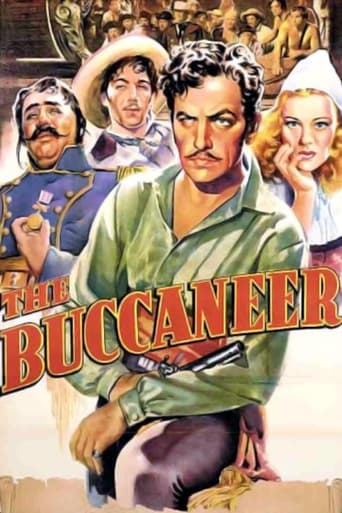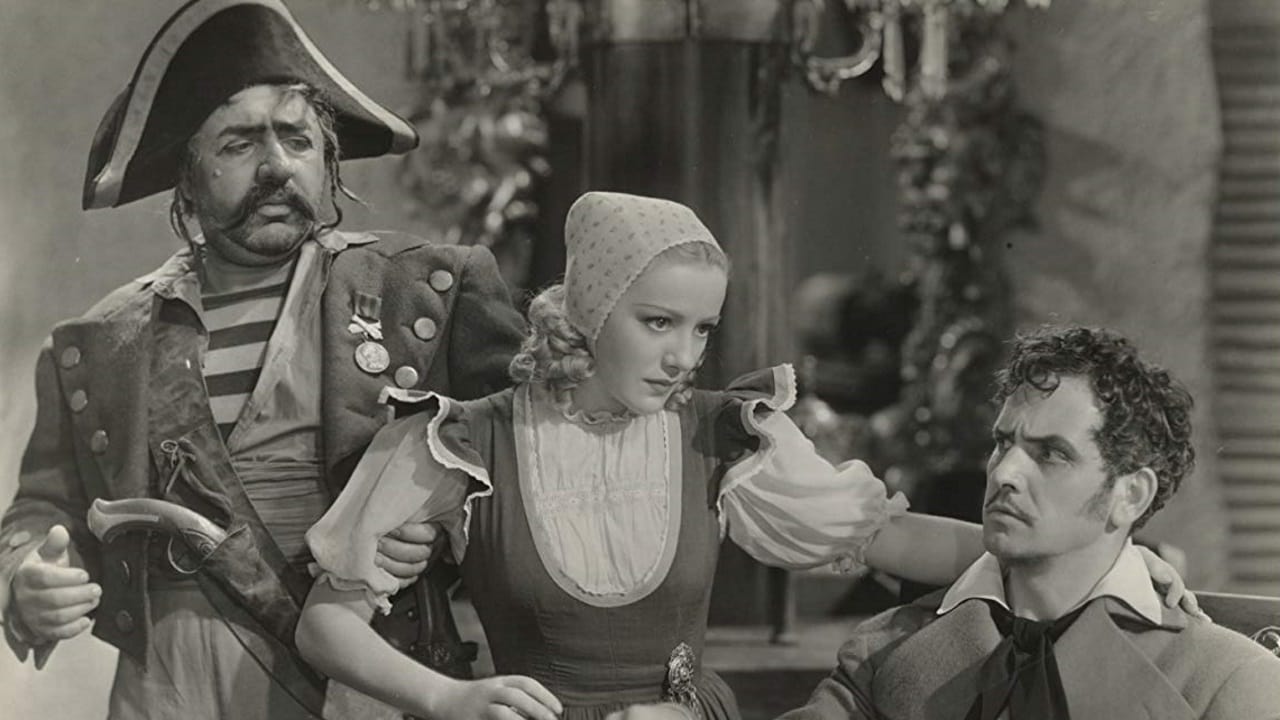MARIO GAUCI
This was the third version I watched of the exploits of French pirate Jean Lafitte, but the first that was made; the others were LAST OF THE BUCCANEERS (1950) and the 1958 remake of the film under review. Interestingly, while De Mille himself produced the latter, he relinquished the directorial reins – presumably because he was too ill for the task – to his son-in-law, actor Anthony Quinn (who had a supporting role in the original!), whose only effort in this capacity it proved to be. For the record, two other cast members were similarly featured in both i.e. Douglass Dumbrille and Jack Pennick.Anyway, this was also the third in my Fredric March epic viewings (with one more to go): it is telling that the star's tendency towards ham (not helped by his adopting a foreign accent – which did not really come into play when he interpreted an Italian in THE AFFAIRS OF CELLINI or a Russian in WE LIVE AGAIN {both 1934}!) was brought out by the director's idiosyncrasies (including a frequent resort to collective singing – albeit of patriotic American songs rather than the usual salty ditties!) that, evidently, were not restricted to his frequent religious ventures. While fine in itself, then, the movie emerges as perhaps the least of De Mille's 1930s spectacles. Incidentally, it had been planned for a local TV broadcast in the mid-1980s which never materialized! As expected, the settings, crowd scenes and action highlights are elaborate as can be; the cast list, too, is extensive – peppered with familiar faces and even a few award-winning actors (a delightful Akim Tamiroff as March's sidekick and a grumpy Walter Brennan, who enters late into the proceedings as his counterpart to General and future American President Andrew Jackson). The latter is effectively played by one Hugh Sothern, who reprised the role a year later for the two-reel short OLD HICKORY. On the other hand, the major female presences (one spunky and the other stately) are decorative more than anything else – the former, Hungarian Franciska Gaal (here being groomed for U.S. stardom but which did not happen), is rather overbearing under the circumstances.The narrative sees privateer Lafitte side with the Americans against the British in the war of 1812; traitorous Senator Ian Keith does his best to make him look bad in the eyes of the people of Louisiana, even having the Navy massacre the pirate band intending to support them!; ultimately, they face-off in a swordfight inside a jail. Eventually, the "boss" reaches an agreement with Jackson, and his contribution (led by former Napoleonic cannoneer Tamiroff's expertise) is vital in repelling the much larger enemy forces. However, when all differences seem to have been settled, an old crime – which a rogue section of Lafitte's men were responsible for but not he personally – resurfaces, so the buccaneer is forced to go into exile, forever roaming the seas
Despite its historical pedigree, the film stands as an example of what used to be branded "enjoyable hokum", of which De Mille was a prime exponent; that said, its professionalism is undisputed and, in fact, Victor Milner's cinematography (which, for one night-time rallying sequence, turns sepia) garnered the movie its sole Oscar nomination. By the way, the "Leslie Halliwell Film Guide" erroneously lists this as having a mere 90-minute duration – when, in fact, the TCM-sourced print I watched (exhibiting some picture instability halfway through which, however, were smoothed over upon being replayed!) lasted a good deal more at 126!!
asinyne
I caught this movie on TCM today and found myself throughly entertained. To my knowledge this was my first ever viewing. The cast was simply superb.....practically everyone. Fredric March was so dashing and effective, I had never realized what a talent this guy was. He even pulled off a French accent flawlessly....whoa! This version of The Buccaneer is simply far superior to the 1958 film which I've seen a couple of times. There was real magic in Hollywood during the 1930s, I'm not sure that town has ever totally recaptured what they had back then. This movie definitely belongs in there with the A list that includes Gone With the Wind, The Wizard of Oz, Captain Blood, Beau Geste, Tarzan, The Hunchback of Notre Dame, Gunga Din, King Kong and all the rest. The script was by a GREAT historical novelist named Harold Lamb. This was a huge bonus for this movie. The story sticks fairly close to history and has a terrific pace. My only complaints are relatively minor....the battle at the end didn't quite live up to my expectations(though it probably did realistically portray the excitement and confusion of the participants) and Lafitte could have simply told the truth about the ship Corinthian which was sunk on the orders of another Pirate, not Lafitte. This was the reason Lafitte got chased away from New Orleans (according to the movie at least) Great movie, great leading man, great writing, great cast, great direction, great sets.....a classic. Oh yes, the actor portraying Andrew Jackson was dead on.....not that I have actually met Old Hickory mind you!
MartinHafer
This film was pretty much what I expected from Cecil B. DeMille. In almost all of his films, you have a huge cast (this time in the thousands), elaborate sets and props, a rather silly romance and a desire for action and expense over realism and historical accuracy. Many love his films, but I find most of them time-passers.As for the romance, this film features two for Jean Lafitte (Frederic March), though the dominant one involves Franciska Gaal. She's rather a comic book-like figure--more a caricature than a believable person and this is pure DeMille, as is the romantic dialog. At least it was much better than the lines uttered in THE TEN COMMANDMENTS by the Princess, but this isn't saying much. DeMille just had no ability to convey real people and real romance--he was more the epic action and spectacle sort of director.Action-wise, there are some very long and well made scenes, though oddly, the naval sequences were awfully tepid. The battle scenes on land were handled much better and the costumes looked very nice.Historically speaking, this isn't a bad film but it does contain many inaccuracies. Apart from glamorizing Jean Lafitte (who was a smuggler and total jerk), it seemed to exaggerate his importance to the Battle of New Orleans. While he did "rat" on the English by telling the Americans of their invasion plans, most accounts place the number of troops he sent to fight to be just a few dozen at most (though they were gunners--a welcome addition). Also, the fact that this battle actually took place a month AFTER the peace treaty was signed wasn't mentioned--as communication was such in 1815 that the British and Americans could not let the troops know that the war had ended for several more weeks. This made the outcome of the battle unimportant (but certainly not to the soldiers involved) and would have taken away from the excitement of the film, so it was simply omitted.While I am complaining, I should also point out that the film never seemed to end. While it logically should have ended when this battle concluded, it continued and greatly lessened the film's impact and made me fidgety.Overall, there's a lot of action (I'd give this an 8), some dopey romance and dialog (I'd give them a 3), some good and bad historically speaking (I'd give it a 5) and the movie was overly long. Overall, I think a score of 5 is merited. A decent time-passer but that's about all.
bkoganbing
Cecil B. DeMille in 1938 turned his talent for spectacle to the legend of pirate Jean Lafitte and his contribution for saving New Orleans from British occupation in 1815 at the battle that bears the city's name.The ironic part is that the Treaty of Ghent ending the War of 1812 had been signed a few weeks earlier, but news had neither reached the invading army commanded by General Edward Pakenham, brother-in-law of the Duke of Wellington; nor the Americans either in Washington, DC or the civil and military authorities in New Orleans. Had the British won they probably would have stayed for several years, I'm sure they wouldn't have given up so valuable a possession as the city that controlled the mouth of the Mississippi river.Jean Lafitte is one of those characters not from antiquity about whom we know neither the date of his birth or death. He was born either in France or Haiti around 1780 and probably died sometime in the 1840s. As soon as the Louisiana territory was purchased from France, he set himself up in business nearby New Orleans in the swamps of Barataria and did a flourishing business in the smuggling trade. He may have had as many as a thousand men under his command.Even after the fledgling American Navy attacked his stronghold, Lafitte for reasons of his own sided with the Americans in the fight for New Orleans that had nothing to do with the fictional romance portrayed in The Buccaneer. He did however provide men and supplies to Andrew Jackson's army and may have tipped the balance of the fight. Though he got a pardon as shown in the film, he resumed his pirate ways and eventually left New Orleans for Galveston Island. Eventually he was driven out of there in the next decade and after that we have no idea what really happened to him, though there is speculation.Fredric March makes a dashing Jean Lafitte and DeMille staged the battle up to his usual high standards of spectacle. In addition to the fictitious romance between Lafitte and the Governor of Louisiana's daughter played by Margot Grahame, the other part of the film that is wholly fictional is that involving the traitorous United States Senator played by Ian Keith. No such a person was around New Orleans, though there was an anti-war movement breaking out here, but in New England which saw its commercial trade ruined by both Jefferson's Embargo and the War of 1812.One thing that DeMille didn't do either in this film or the remake in 1958 was focus on Pakenham. The army that went to its slaughter in the swamps near New Orleans in a headlong assault were a veteran bunch of troops who had fought in the Peninsular War against Bonaparte. The commander was a much beloved brother-in-law of the Duke of Wellington and he fell gallantly leading his men. Wellington thought of Ned Pakenham more like a kid brother of his own than his wife's brother. He took the news of the defeat pretty badly. In fact the news cast a pall over Great Britain so recently celebrating Napoleon's exile to Elba. Fortunately they and Wellington recovered to route Bonaparte in his comeback attempt at Waterloo. Walter Brennan has a nice role as Andy Jackson's personal aide and Hugh Sothern is an impressive Jackson. DeMille introduced actress Franciska Gaal from Hungary in the role of castaway passenger from a ship that was plundered by one of Lafitte's ships. She didn't make much of an impression on the American public, perhaps it was her thick Magyar accent. After a film with Bing Crosby the following year, Paris Honeymoon, Gaal returned to Europe just in time for World War II and to a country allied with the Axis at that point. She was not heard from again on film.When the remake came out in 1958, Paramount shelved this version of The Buccaneer and was rarely shown for the rest of the century. I got to see it during a TCM retrospective of Cecil B. DeMille. It's good DeMille, but far from good history.



 AD
AD

